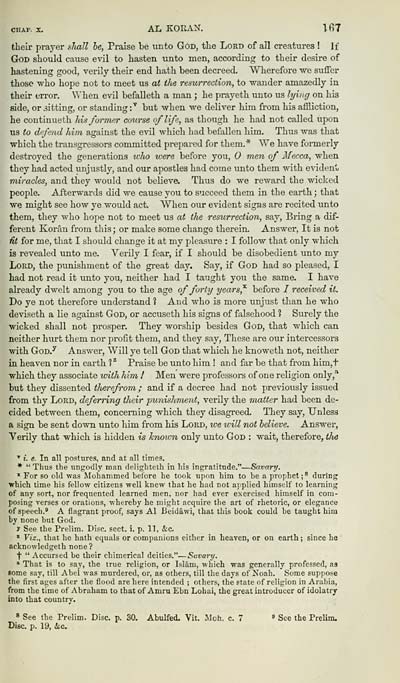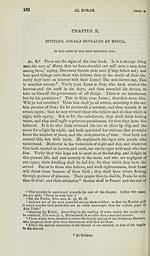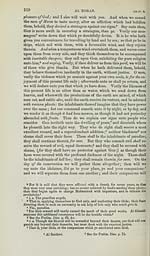Download files
Complete book:
Individual page:
Thumbnail gallery: Grid view | List view

CHAP. X. AL KOKAN. Tfi7
their prayer sliall he, Praise be unto God, tlie Lord of all creatures ! If
God should cause evil to hasten unto men, according to their desire of
hastening good, verily their end hath been decreed. Wherefore we suffer
those who hope not to meet us at the resurrection, to wander amazedly in
their error. \^'hen evil befalleth a man ; he prayeth unto us lying on his
side, or sitting, or standing : ' but when we deliver him from his affliction,
he continueth his former course of life, as though he had not called upon
us to defend him against the evil which had befallen him. Thus was that
which the transgressors committed prepared for them.* We have formerly
destroyed the generations icho were before you, men of Mecca, when
they had acted unjustly, and our apostles had come unto them with e\ddenu
miracles, and they would not believe. Thus do we reward the wicked
people. Afterwards did we cause you to succeed them in the earth ; that
we might see how ye would act. When our evident signs are recited unto
them, they who hope not to meet us at the resurrection, say, Bring a dif-
ferent Koran from this ; or make some change therein. Answer, It is not
At for me, that I should change it at my pleasure : I follow that only which
is revealed unto me. Verily I fear, if I should be disobedient unto my
Lord, the punishment of the gi-eat day. Say, if God had so pleased, I
had not read it unto you, neither had I taught you the same. I have
already dwelt among you to the age of fort?/ years^ before / received it.
Do ye not therefore understand 1 And who is more unjust than he who
deviseth a lie against God, or accuseth his signs of falsehood ? Surely the
wicked shall not prosper. They worship besides God, that which can
neither hurt them nor profit them, and they say. These are our intercessors
with GoD.^ Answer, Will ye tell God that which he knoweth not, neither
in heaven nor in earth 1 ^ Praise be unto him ! and far be that from him,t
which they associate tuith him ! Men were professors of one religion only,'"*
but they dissented tlierefrom ; and if a decree had not previoiisly issued
from thy Lord, deferring their punisli^ment, verily the matter had been de-
cided between them, concerning which they disagreed. They say. Unless
a sign be sent down unto him from his Lord, we will not believe. Answei',
Verily that which is hidden is known only unto God : wait, therefore, the
* i. e. In all postures, and at all times.
* " Thus the ungodly man delighteth in his ingratitude." — Savary.
^ For so old was Mohammed before he took upon him to be a prophet ;8 during
which time his fellow citizens well knew that he had not applied himself to learning
of any sort, nor frequented learned men, nor had ever exercised himself in com-
posing verses or orations, whereby he might acquire the art of rhetoric, or elegance
of speech.' A flagrant proof, says Al Beidawi, that this book could be taught him
by none but God.
y See the Prelim. Disc. sect. i. p. 11, &c.
* Viz., that he hath equals or companions either in heaven, or on earth; since he
acknowledgeth none?
f " Accursed be their chimerical deities." — Savari/.
* That is to say, the true religion, or Islam, which was generally professed, as
some say, till Abel was murdered, or, as others, till the days of Noah. Some suppose
the first ages after the flood are here intended ; others, the state of religion in Arabia,
from the time of Abraham to that of Amru Ebn Lohai, the great introducer of idolatry
into that country.
8 See the Prelim. Disc. p. 30. Abulfed. Vit. Moh. c. 7 » See the Prelim.
Disc. p. 19, iic.
their prayer sliall he, Praise be unto God, tlie Lord of all creatures ! If
God should cause evil to hasten unto men, according to their desire of
hastening good, verily their end hath been decreed. Wherefore we suffer
those who hope not to meet us at the resurrection, to wander amazedly in
their error. \^'hen evil befalleth a man ; he prayeth unto us lying on his
side, or sitting, or standing : ' but when we deliver him from his affliction,
he continueth his former course of life, as though he had not called upon
us to defend him against the evil which had befallen him. Thus was that
which the transgressors committed prepared for them.* We have formerly
destroyed the generations icho were before you, men of Mecca, when
they had acted unjustly, and our apostles had come unto them with e\ddenu
miracles, and they would not believe. Thus do we reward the wicked
people. Afterwards did we cause you to succeed them in the earth ; that
we might see how ye would act. When our evident signs are recited unto
them, they who hope not to meet us at the resurrection, say, Bring a dif-
ferent Koran from this ; or make some change therein. Answer, It is not
At for me, that I should change it at my pleasure : I follow that only which
is revealed unto me. Verily I fear, if I should be disobedient unto my
Lord, the punishment of the gi-eat day. Say, if God had so pleased, I
had not read it unto you, neither had I taught you the same. I have
already dwelt among you to the age of fort?/ years^ before / received it.
Do ye not therefore understand 1 And who is more unjust than he who
deviseth a lie against God, or accuseth his signs of falsehood ? Surely the
wicked shall not prosper. They worship besides God, that which can
neither hurt them nor profit them, and they say. These are our intercessors
with GoD.^ Answer, Will ye tell God that which he knoweth not, neither
in heaven nor in earth 1 ^ Praise be unto him ! and far be that from him,t
which they associate tuith him ! Men were professors of one religion only,'"*
but they dissented tlierefrom ; and if a decree had not previoiisly issued
from thy Lord, deferring their punisli^ment, verily the matter had been de-
cided between them, concerning which they disagreed. They say. Unless
a sign be sent down unto him from his Lord, we will not believe. Answei',
Verily that which is hidden is known only unto God : wait, therefore, the
* i. e. In all postures, and at all times.
* " Thus the ungodly man delighteth in his ingratitude." — Savary.
^ For so old was Mohammed before he took upon him to be a prophet ;8 during
which time his fellow citizens well knew that he had not applied himself to learning
of any sort, nor frequented learned men, nor had ever exercised himself in com-
posing verses or orations, whereby he might acquire the art of rhetoric, or elegance
of speech.' A flagrant proof, says Al Beidawi, that this book could be taught him
by none but God.
y See the Prelim. Disc. sect. i. p. 11, &c.
* Viz., that he hath equals or companions either in heaven, or on earth; since he
acknowledgeth none?
f " Accursed be their chimerical deities." — Savari/.
* That is to say, the true religion, or Islam, which was generally professed, as
some say, till Abel was murdered, or, as others, till the days of Noah. Some suppose
the first ages after the flood are here intended ; others, the state of religion in Arabia,
from the time of Abraham to that of Amru Ebn Lohai, the great introducer of idolatry
into that country.
8 See the Prelim. Disc. p. 30. Abulfed. Vit. Moh. c. 7 » See the Prelim.
Disc. p. 19, iic.
Set display mode to: Large image | Transcription
Images and transcriptions on this page, including medium image downloads, may be used under the Creative Commons Attribution 4.0 International Licence unless otherwise stated. ![]()
| Early Gaelic Book Collections > J. F. Campbell Collection > Koran: or, Alcoran of Mohammed > (321) |
|---|
| Permanent URL | https://digital.nls.uk/77137626 |
|---|
| Description | Volumes from a collection of 610 books rich in Highland folklore, Ossianic literature and other Celtic subjects. Many of the books annotated by John Francis Campbell of Islay, who assembled the collection. |
|---|
| Description | Selected items from five 'Special and Named Printed Collections'. Includes books in Gaelic and other Celtic languages, works about the Gaels, their languages, literature, culture and history. |
|---|

